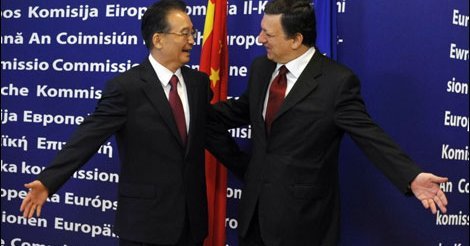A view from the bridge: The EU’s position vis-à-vis China
EU-China trade relations have been characterised by dynamism. Ever since the establishment of economic relations in 1978, and according to EC statistics the volume of trade has increased more than 30-fold, reaching €428.7 bn in 2011. China is today the EU’s second biggest trading partner after the US. The second most salient aspect about EU-Chinese trade relations is their asymmetry; in 20 years, the EU has been cumulating an important trade deficit with China, which in 2011 mounted up to €156.3 bn.
These figures have raised alarms in most European countries, although with around 18 per cent of the world’s total share of imports and exports on its own territory, it can still be argued that the European Single Market is pretty much a closed economy. To put it simply, it is not China’s economic rise that Europe should be afraid of, not in trade terms at least, as even in spite of its great and ever increasing deficit with China, the European Single Market is quite self-sufficient and the United States still makes up for most of European trade.
The inevitable question is why China is such a threat to Europe and the answer is much more strategic than economic.
“Divide et impera”–the Chinese strategy towards EU Members States
The prevalence of the intergovernmental scheme in terms of foreign policy has weakened the EU’s approach towards China. The seductive economic power of China is such that each Member State of the European Union aims to pursue its own strategy of rapprochement with the giant, even if that may go against the interests of the whole of the EU.
China is well aware of these differences among Member States and exploits them for her own benefit. Annoying as it may be, dealing with 27 Member States has the advantage of making them play one against the other, lowering the final conditions. In this non-cooperative game, we can distinguish different types of European countries, which can be grouped according to their economic might: the industrialists vs. the non-industrialists, whose most exponential cases are Germany and Greece, respectively.
The industrialists are the only ones who have the economic might to stand against China on both political and economic issues. Germany, China’s largest trading partner in the EU, conducts its Chinese policy pragmatically. Its aim is to press China so as to acquire sector-specific demands, and to impose “anti-dumping” measures, to protect its industry from subsided Chinese goods. As a result, it pursues a silent policy of bilateralism: neither does it impede European-level negotiations, nor does it encourage them. It is one of the few countries that still has a relationship of complementarity with China, even if Germany itself has an important trade deficit with China.
The non-industrialists, on the other hand, are the great losers in the EU-China relationship: their economies are not complementary but competitive with the Chinese and, for that reason, they resort to any measure that can undermine Chinese capability of penetration in Europe. Still, they need to seek for commercial benefit, especially via Chinese foreign investment in their countries, for what they do not challenge Chinese policies at all: they believe that good political relations are key to obtaining commercial benefit.
EU-China relations and the crisis
The 2008 crisis has only made this situation worse, as it made the stance of the non-industrialists more vulnerable. China supposes two fundamental opportunities for indebted countries like Greece: on the one hand, it offers them a line of credit without any kind of conditionality, which is a far better deal than that offered by the troika (FMI-CBE-EC). So far, China has bought more than €630 bn of European sovereign debt. On the other hand, it offers jobs for a population where unemployment has peaked over 22.5 per cent. China has begun implementing a new strategy, ironically baptized “made in Europe”: European workforce, Chinese management, strategy which not only allows for opportunistic low production costs, but also for the fulfilment of European Single Market’s standards by Chinese companies.
At first sight, it looks like an intelligent way that the countries of the south have found to finance themselves, when the countries of the north of the European Union are reluctant to rescue them. But Chinese companies have slowly begun to implement their own working standards in Europe. Chinese penetration in Europe via the acquisition of companies and/or the outsourcing to poorer European countries has begun to erode the traditional European welfare state, attacking its weakest members. This will not only have repercussions in the working conditions and living standards of impoverished countries like Greece, but will also slowly start to establish a trend which had been almost eradicated within the European Union: social dumping. This is the kind of strategic challenges that Europe should take into account when dealing with the rise of China.
The EU should stop regarding China as a threat and start regarding her as an opportunity. But, for that to happen, it first needs to solve its internal crisis: the different approaches of individual Member States towards China –a fact from which China profits –, and the lack of a coherent European Common Foreign Policy is not only impeding the EU to gain more bargaining power vis-à-vis China, but is also beginning to erode the foundations of European integration. The unrestricted Chinese penetration into the south of Europe is the result of the lack of solidarity and agreements between the two great blocks in which the European Union has been divided by the crisis. EU-China relations should act as a mirror for the EU to look at herself. They are more than a stress test; they are a lesson for survival.

Follow the comments: |
|
